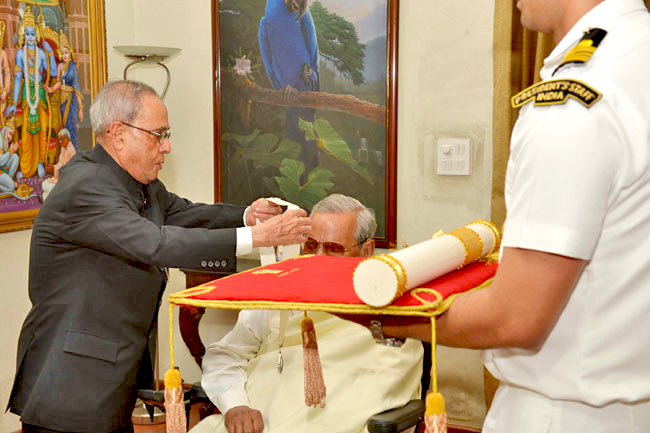Lucknow, Mar 28: The conferring of Bharat Ratna on Atal Bihari Vajpayee in Delhi on Friday has come as a special moment of glory for residents of Lucknow, with the general feeling that it is an honour for a gentle soul the likes of which are becoming rarer in public life.
Not only among leaders and workers of the Bharatiya Janata Party, but among people across party lines the sentiment is that of gratitude. His simplicity, oratory and fondness for simple joys of life like cracking an innocent joke, sharing tea and sweets with anyone who was with him, playing with children and above all, remembering people even after long passage of time, are remembered by people.

The conferring of the honour was the talk of the town in Old Lucknow’s Chowk locality where many persons have had long and non-political association with Vajpayee. A visit to the narrow lanes of Chowk also yielded many little-known facets of Vajpayee's life.
Ashish Tripathi of the famous Raja thandai shop in Chowk, says Vajpayee often used to come to the shop to drink a glass of thandai, accompanying a friend on a bicycle. "He was so fond of this thandai that he mentioned it in many of his speeches in Lucknow in those years," says Ashish.
Vajpayee’s fondness of sweets is well-known. He had a weakness for pedas from a shop in Chowk. Anyone who went from Lucknow to Delhi to meet Vajpayee used to take a package of pedas from the shop, says Dilip a worker in the shop.
A popular figure of Chowk is veteran politician Lalji Tandon, who was member of Lok Sabha from Lucknow after Vajpayee till the last election, had been a long time associate and confidant of Vajpayee. Tandon was in New Delhi to attend the ceremony in which President Pranab Mukherjee went to Vajpayee’s residence to confer him the country’s highest civilian award.
Dr SC Rai, Lucknow’s former mayor, recalls that he had treated Vajpayee's father in 1956 for an abdominal ailment later diagnosed as cancer. "I was the resident doctor in the medical college and had been instructed to take good care of him. He often used to rest on the benches near my house, use the washroom in my house and had a cup of tea, reading the morning newspaper."
Dr Rai recalls that a long time after this he had gone to Delhi to listen to Vajpayee’s speech in Parliament. "He not only noticed me but also invited me to have tea with him." He last met him in 2005 in Delhi and had dinner with him. "He was very fond of gardening and had lots of interest in bonsai, asking questions about how it was done," says Dr Rai.
Laxmikant Bajpai, the state BJP president, said he was fortunate to have got the opportunity to work under Atal Bihari Vajpayee. "What I remember most about him was his oratory and the poetic manner in which he explained and put across the most difficult subject." He also recalled that Vajpayee’s popularity transcended political boundaries.
BJP general secretary Sunil Bansal recalled that Vajpayee never forgot to mention national interest in whatever organisational activity was taking place. "He was nationalist to the core and the interest of India had always been uppermost in whatever he spoke or did."
A recitation of Hanuman Chaleesa, display of fireworks and distribution of sweets at the state BJP headquarters marked the occasion. A large number of workers and supporters had gathered in the party office premises who shouted slogans and sang songs praising Vajpayee.
"This is a decision with which none of us can find any fault. He was much more than merely a party leader and while I and many like me had our differences with the Jan Sangh and later the BJP, an honour to Atalji has been our wish also,” this came from a retired Lucknow University teacher PK Srivastava who is settled in Lucknow.
Asif Zamaan Rizvi, whose father Aizaz Rizvi was a minister in a former BJP government in the state and an associate of Vajpayee, said he and many others like him felt sad that they had not seen Vajpayee for a long time. "But the ceremony in his residence in Delhi has come as a reassurance that he is well."





Comments
Add new comment